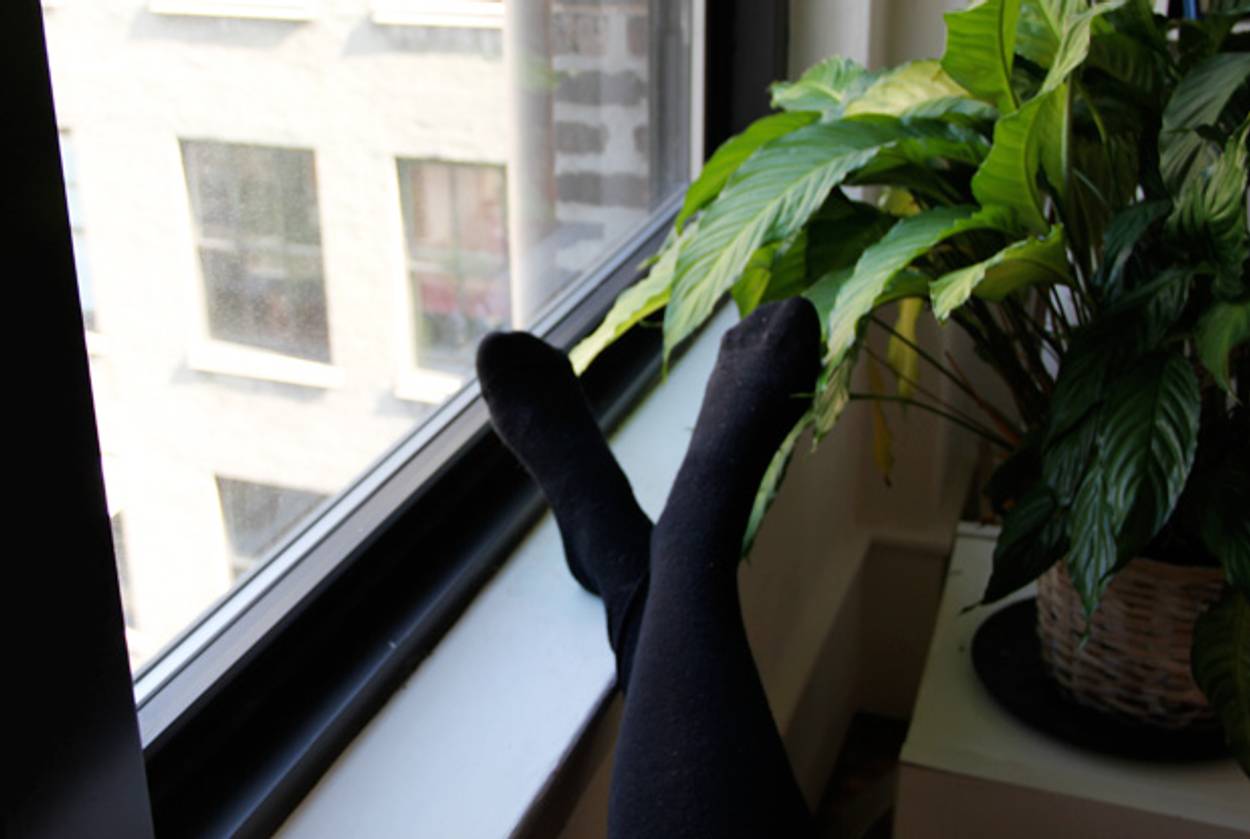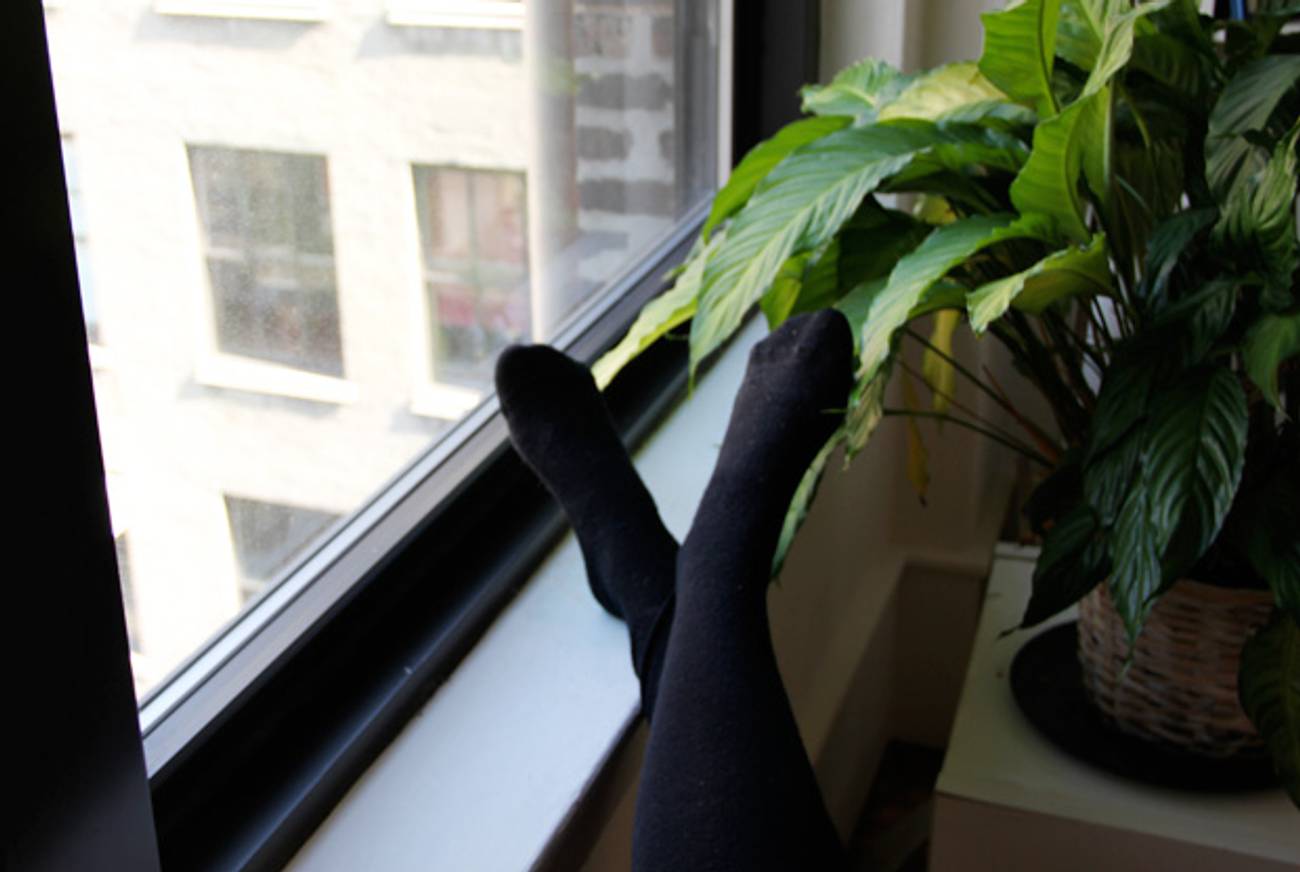Tights Squeeze
While Orthodox girls obsess about skirt length and hosiery choices, are we overlooking Judaism’s most important lessons about modesty?




A friend asked me to serve as a match-reference—that is, to attest to the virtues of a prospective bride—for her older (Torah-learned, black-hat-wearing) brother. My friend, apparently, had discovered, through other references, that the young woman in question did not always wear appropriate hosiery.
“I’m just confused,” she told me. “Because I thought you even specifically mentioned that you thought she wears tights, and I would just be surprised if she didn’t wear some sort of socks or tights, based on the level of piety that I heard about her.”
“I must admit,” I said, “I don’t spend much time looking at ankles. I tend to look people in the eye.” Then, sensing my friend’s dissatisfaction with my answer, I added: “But I’m pretty sure she wears some sort of socks.”
I then proceeded to dissuade the match—solely for the sake of the prospective bride, whose résumé had clearly been analyzed for hours over a kitchen table by the mother and sister of the scholarly yet clueless bachelor.
***
Welcome to a culture that no one outside will ever understand—that of the yeshiva girl. It’s an insular, narrow space, where the outside world is demonized en masse; where religion becomes a competition in which everything is tallied up, right against wrong, and every additional stringency that is taken on instantly earns communal admiration. (One of my few relatively modern teachers in high school dubbed this “Orthodox Compulsive Disorder.”)
When choosing to be Orthodox, I sought authenticity and reason, passionate spirituality, closeness with God and with history. I love my religion, traditions, law, community, the small politics, the debates over the Shabbat table about the heights of the mechitzah in shul. But the widespread neuroticism, the vehement zeal: This is something new. This isn’t the brand of Orthodoxy that I embraced and emulated growing up, and it’s not the religion for which my parents defied our Russian family’s avowed secularism.
I don’t want to be that girl: the aspiring writer who has broken free of the tightly knit Orthodox community or school system and then proceeds to write about her love-hate relationship with said background. Because the truth is, I’m not that girl who’s broken away. I pray daily, recite benedictions before and after food, study Torah (but not Talmud). I still feel uncomfortable reading Aramaic texts traditionally limited to men. Friday afternoons find me running around the house, covering bathroom lights with special Shabbat covers, choosing tablecloths, filling the hot-water urn. And if it matters, which I suppose it does these days, I dress the part, too, despite being taught otherwise by secular grandparents: I wear modest skirts that reach my knees, sleeves that cover my elbows, and I refrain from any physical contact with males.
But I also wear stilettos. I also study Tennyson, Nabokov, and Joyce; I read the New York Times avidly, attend film screenings and art galleries. In the past few years, after leaving the comforts of my high school, where everything had been carefully dictated and prescribed, I’ve been trying to balance Torah u-Madda, religious studies with science or secular studies.
So much so have I entered the world of Torah u-Madda that I’d almost completely forgotten about the world I left behind. It took a conversation about hosiery to remind me why I am where I am today.
My friend’s query about that prospective bride’s tights floods my mind, for a half-second, with memories of the all-girls Orthodox high school we attended together. Kind teachers encouraging us to understand that our long sleeves might be a bit too tight. Running past teachers down the stairwell before they noticed that I wasn’t wearing tights in my ballerina flats. While my friend had gone on to seminary in Israel and chosen to be more stringent, I had chosen to go to Yeshiva University, bastion of modern Orthodoxy. To the outsider, the two seem indiscernibly similar, but to the insider in the Orthodox Jewish community, the two worlds couldn’t be more different.
My younger sisters, who still attend that all-girls high school, have been alluding to problems with particular teachers in vague text messages and sighing phone calls. When I came home one weekend, we went to a local coffee shop to discuss their issues in depth. One sister began to cry as told me how her rabbi had told the class that one who transgresses the boundaries of forbidden physical contact, even in the most casual and unaffectionate of manners, a mere handshake, is considered adulterous and thus is deserving of death, according to biblical law. “That just makes me want to go to the Gap and buy a pair of skinny jeans,” she told me, pulling her denim skirt to cover her knees as she sat down.
Another teacher announced proudly that the walls of her house have never seen her hair, just like the righteous mothers of the Talmud. “I sleep with my head covered, girls. Always.”
Yet another teacher brought in an article from the ultra-Orthodox magazine Mishpacha. The story followed a Jew in 1950s Soviet Russia who expressed an interest in studying Judaism but never did so because of the danger involved. The teacher explained: “Girls, what do we learn from this? That this man clearly sinned! One should always follow through with one’s intentions!”
My sister tried to argue; as the daughter of Soviet immigrants, she grew up with an understanding of what it meant to be Jewish in the USSR. “He was risking his life—” my sister began. The teacher dismissed her: “Yes, but one must risk one’s life for the sake of Torah.”
Her stories reminded me of my own teachers, including one who had quoted the Talmud on bestiality and then added in half-jest, “Now, you may say that bestiality is irrelevant today, but I’m not sure, looking at the way Western society is today … it might just be the next big thing.”
Looking back, I wondered at the hold this education and lifestyle had over me, the fearful guilt with which everything had been infused. The second I had secretly questioned a stringency or attitude, I would rush to hush my doubts. This is your evil inclination speaking. They are clearly right, they are clearly holier, you know nothing because your family isn’t religious.
It disturbs me that a shred of this irrational guilt still remains, no matter how modern and progressive I claim to be.
It plagued me last summer in Israel. My first day in Jerusalem, I stepped out of the Western Wall plaza, half-dizzy from elation, and was immediately approached by an old, pious-looking woman. She was shaking her finger, screeching, “Erva!” and pointing to my hair, which was partially covered with a scarf. “Nakedness! How dare you not dress as a daughter of Israel, in the holiest of places? Where is the respect? How dare you not respect your husband, and the holiness of this place?” I was at such a loss for words that I didn’t know how to explain that I’m not even married, I’m not required to cover my hair—and I wondered why I’ve grown defensive. Why did I feel a need to explain myself to this woman? Where was the respect from her end?
There were other moments. Like being shoved into the back of a bus leaving from the Kotel on Saturday night. Women to the back! Young men (boys! children!) hooted and sneered into megaphones by the bus stop that there ought to be a separation of seating. And at first, I accepted it, without thought—of course, this is where a woman belongs.
Even during a Shabbat spent in a Jerusalem suburb with a Chardal (Zionist ultra-Orthodox) family. In front of her guests, my hostess scolded her 16-year-old daughter, “I see your collarbone, Leah. If you wear that shirt one more time, I swear I’ll take it away from you.” The hostess then turned to me, glanced at my coincidentally floor-length skirt, and commented, “You see Avital’s skirt? Girls, you should wear something like that. It’s so tznius.”
I wish I could have shown her the shorter and tighter pencil skirts that I left behind in my closet. Instead I quipped, “Yes, have you seen the Ramat Bet Shemesh women? They’ve taken to wearing burqas. Now, those are really tznius.”
My sarcasm went undetected. “Yes, indeed,” the hostess said, taking her glasses off with a sigh. “Those women are so modest. We can’t judge them, they’re on a much higher level than we are.”
It was just like the world of my high-school days, a world where so much is fueled by guilt—but also by exhibitionism, where it’s fashionable to publicize one’s piety, determined by the denier count of one’s stockings and the looseness of one’s sweater. Mention a restaurant you ate at yesterday, and the girl sitting next to you might raise her eyebrows and say, “Really? You eat there? Because I’m not sure about that kashrus certification. It’s not so reliable.” Your classmate might come into school one day, holding a tube of sewing glue, and whisper in your ear, “It’s for the slit in the back of your skirt. I can see the back of your knee.”
So much, it seemed, depended on covering ourselves—and in some circles, it still does. One young woman recently apologized to me that her husband doesn’t know any modern Orthodox young men to introduce me to, and that perhaps if I wore tights it would be a different situation. Soon afterward, I found out that she’s having an extramarital affair with a yeshiva student and is pregnant with his child. “Well,” I thought, “at least she wears tights.”
Back in high school, when we girls would ask our teachers for the source of the laws of modesty, the classic answer was to turn to Micah 6:8. Yet now it dawns on me that the same text has been misread, poorly taught. When Micah enjoins Israel to “do justly, and to love mercy, and to walk modestly with thy God,” his final verb is to walk with God. Modestly is simply the adverb.
He essentially is asking that our piety, our walks with God, be done modestly—he’s not asking us to hide our women. Nor to confine them to specific streets, nor to the back of the bus.
Perhaps, rather, he is asking us to keep our piety modest. No one needs to know how many pages of Talmud you’ve learned today, what kosher certification you don’t trust, how intensely you sway during prayer—or how thick your tights are.
Avital Chizhik is a writer living in New York City and a frequent contributor to Haaretz.
Avital Chizhik is a writer living in New York City and a frequent contributor to Haaretz.